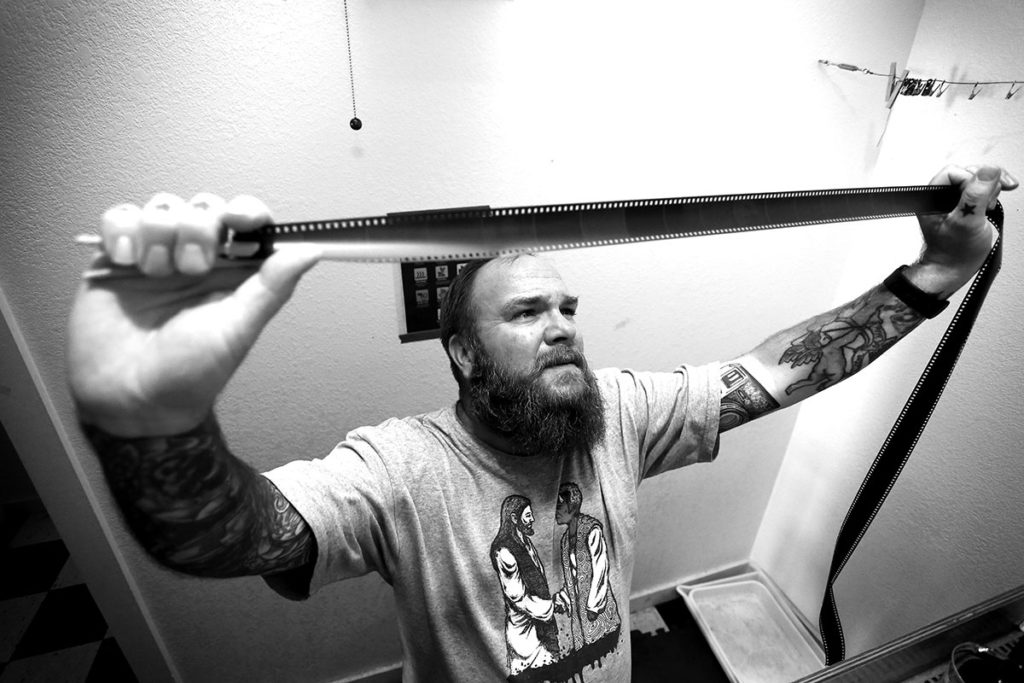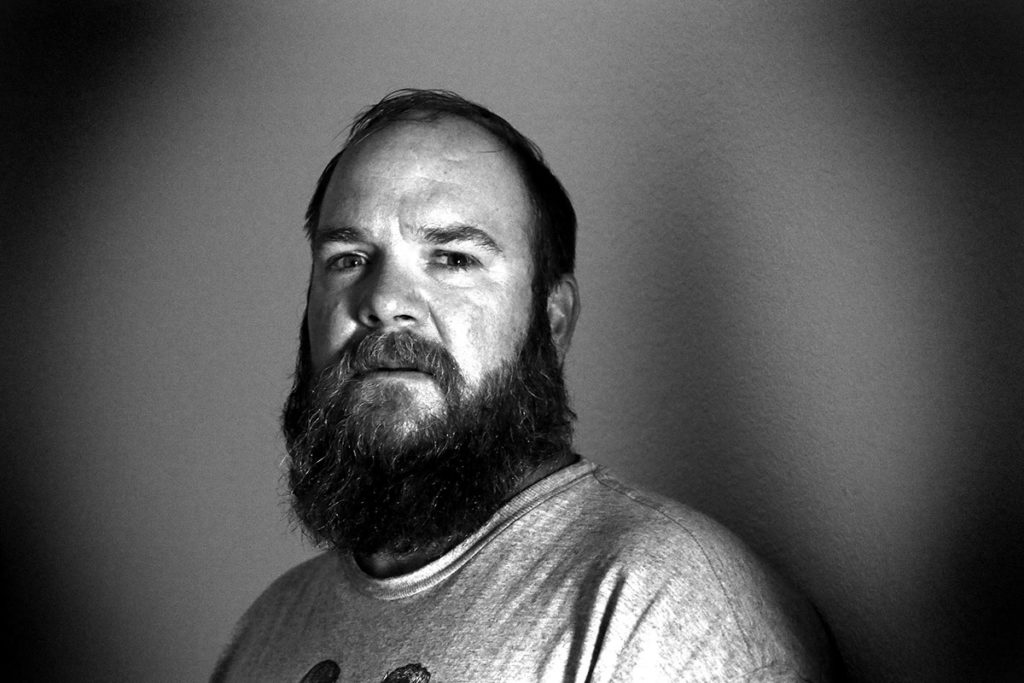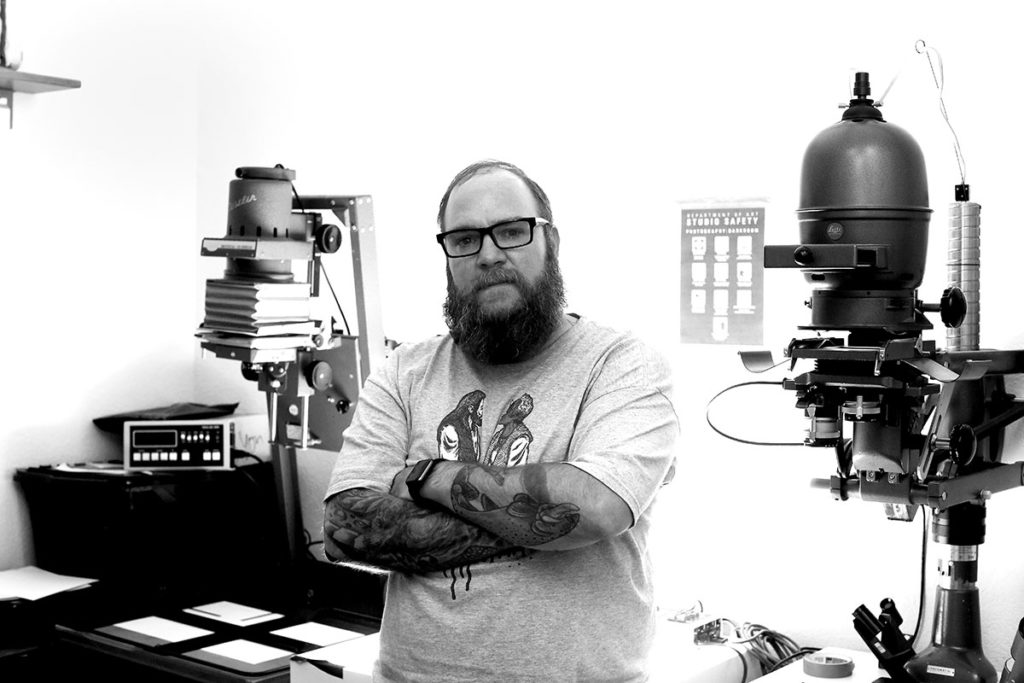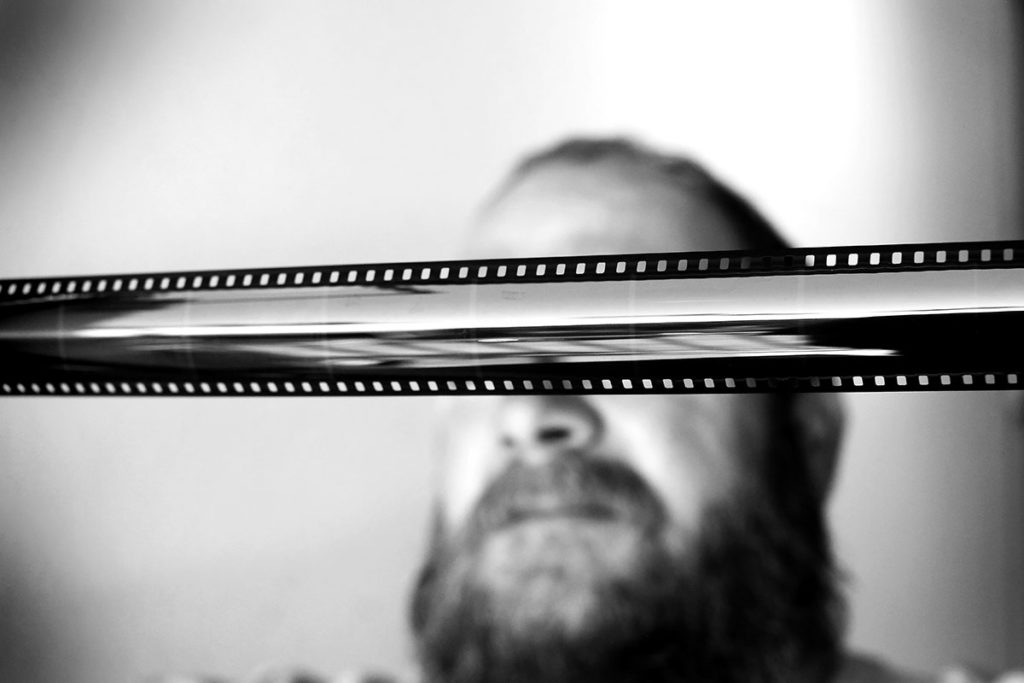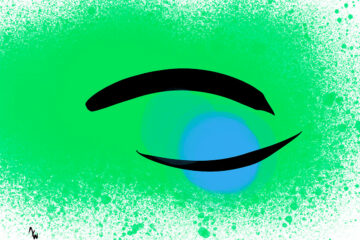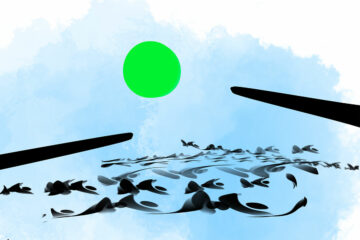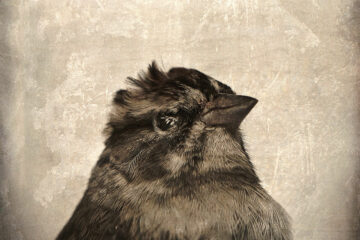Brian Tryon is developing rolls of 35-millimeter film in a darkroom. He unfurls a roll he’s already processed and holds it to the light to get an early look at what’s there.
Whatever he sees there, it’s a success.
“Even if it’s not ideally what I wanted, it’s still, ‘I did that. I created that. It was something I created from my soul through this process,’” he says.
When Brian talks about the soulfulness of his connection with photography, it comes from a raw and honest place. He’s 11 years sober, and more than a dozen years clean. Photography has played a significant role in his recovery.
While in the darkroom, Brian, 46, shares with Humanitou about the fog of alcoholism and the guilt he still can’t shake. He talks about B-boying in the 80s and why he opts for film over digital photography.
Brian, now a grandfather and a prolific artist, pays forward his life lessons. He teaches photography at Community Prep School, and teaches darkroom classes at the Manitou Art Center in Manitou Springs, Colo.
“There’s positives out of negatives,” he says. True of photography, true of life.
Meet Brian Tryon.
Humanitou: What is it you connect with in photography?
Brian: I’ll go back to the beginning. I was an addict and an alcoholic for many years. It took me away from art and music and family, and my soul, my life.
When I got sober, the fog started lifting and I was coming to some clarity again. I needed some kind of connection. I tried picking up the guitar. I tried to do this and I tried to do that, you know.
I remembered I used to photograph all the time, even in my drunken state. Cell phones had cameras on them, and I just started photographing and photographing. I thought, “What am I going to do with all this stuff?”
Then I started realizing that it seemed healthy, an escape. I could go on a walk, shoot photographs of whatever I wanted. There was nobody telling me what to do or how to do it.
I found a release from that that I used to search for with drugs, alcohol, whatever. There was a hole and photography was filling that back up again.
Humanitou: What was going on during that period for you? What led you to push aside things that were meaningful?
Brian: Eighties hip-hop music really got me into art and graffiti. I was a breakdancer. And then, when I started skateboarding in the early Eighties, it really jumped me into all my artistic whatever.
But at that age, I was already well on my way to being an alcoholic. I had never experimented with drugs. Alcohol was my thing. I was 14 years old, 15 years old.
I’d still skateboard but, as time went on, I was realizing alcohol and drugs were more important than skateboarding and art and music, anything like that. And alcohol gatewayed me into using.
This blur of years expanded into where I wasn’t really doing anything but drinking and using. I broke my skateboard in half, at one point. I said, “I’m never skateboarding again.”
I was a dad at a really early age, at 17.
For about a year span in like, 1990 to ’91, I sobered up. I didn’t get sober. I just kind of quit drinking. I’d moved with my ex-wife to another state. I’d moved away, thinking that was going to solve some problems.
But once I moved back, I just wanted to drink. It was all I wanted to do.
I was never abusive to my kids, but I was never there. I wasn’t present. I guess that’s a form of abuse.
In my thirties, I figured out this was going to kill me. I had that realization. Working with myself and working with the 12-step program popped me out of it.
Once that fog got lifted, I was able to jump back into having a passion other than drinking and drugging.
I got back into painting and photography about eight years ago.
Humanitou: Alright, Eighties hip-hop. Who were you into?
Brian: I remember listening to Grand Master Flash and Kurtis Blow and Run DMC. All that kind of stuff.
I hung out at this boys’ club up off of Shelton and Fountain. It was a super black and Hispanic community. I hung out with a lot of those people, and that culture has always been a super-cool culture, and I vibed on the music.
That’s where I got my start. Then graffiti came along, and breakdancing. I latched onto that. Off of that came skateboarding.
Humanitou: Were you a B-boy, breakdancing on the corner, picking up money or what was happening with that for you?
Brian: All of that. I don’t know if I’m a trend follower. When I find something, I just grasp onto it. So, early Eighties, I started getting into Prince and soul music.
Then a friend of mine, who was introduced to rap music from back in that time, said, “Check this out!” and put it in my tape player. It was one of those life-changing things.
I started getting with these different dancers. There was a pretty good scene back at that time. I was able to hang out with black people, Hispanics and Asians. It was cool to grow up around diversity like that. I wasn’t stuck with just one culture or one race. I felt pretty privileged with that.
We’d breakdance on corners. We weren’t a gang. They call it a crew. We’d dance on the corner. We’d perform at places. We’d battle. Another neighborhood would come over and, instead of shooting or fighting, you breakdanced.
Maybe sometimes there’d be some asshole that wanted to take it to another level. But it more was just cool. It was an art, it was a form of expression.
Humanitou: And now it’s mainstream. You can watch B-boys battle on Netflix or wherever. I don’t know if it’s a resurgence or what.
Brian: I think it is. Even with skateboarding, Tony Hawk is like the Michael Jordan of skateboarding now. Back when I was growing up, you got made fun of if you skateboarded, where I grew up.
The clothing, the style. I remember having Vans in seventh-grade in the Eighties and used to get made fun of for it. Now everybody wears Vans and Thrasher shirts, and Tony Hawk is a household name. It’s kind of the same thing with breakdancing.
Humanitou: You photograph prolifically these days. You show often in galleries and post a lot on social media. You also shoot a lot of film. Why film in this digital age?
Brian: Photography definitely replaced a lot of stuff I was looking for, the negative stuff in my life. I was comfortable with it. I was getting some responses. For me, I felt the Ansel Adams thing where it starts with your heart and your mind’s eye.
It’s got to have some soul to it, some rhythm to it, some rhyme to it. Anybody can push a shutter button and anybody can take a photo on their phone, but there’s more to it. For me, photography is capturing a moment, holding a moment.
I remember as a kid growing up, there were photo albums, physical photos, and you’re looking through photos. That always intrigued me. You’re capturing something.
On this recent trip to Alaska, my digital camera was glitching and doing weird stuff. But film, as long as there’s no fire or water damage, you can keep that and have a physical, tangible kind of experience.
It’s something about making the photographs. It’s from the very beginning: It’s from your heart, your mind, your eyes. And then you go make the photographs.
You mix the chemicals and put the film in the tray. You have this physical, touchable, organic kind of thing.
Humanitou: What do you love about that process, when you’re watching for the print to materialize in the tray, right in front of your eyes?
Brian: It’s like Christmas time.
I use this with my students. You might get a brown pair of socks. As a kid, you don’t like brown socks. Or you might get a new iPhone 10,000x+z. Or you might get something in the middle. You don’t know.
You might think you did everything you were supposed to do in the camera, that you did everything you were supposed to do artistically. And then you don’t know what you got.
At the same time, I’m still pretty excited that I made what I made. Even if it’s not ideally what I wanted, it’s still, “I did that. I created that. It was something I created from my soul through this process.”
It’s that soulfulness. Going back to addiction, that kind of stuff just steals your soul, man. Getting that back is pretty rad, dude.
Humanitou: Where are you with your recovery now?
Brian: I’m 11 years sober and about 12, 13 years clean. It’s a day-by-day thing, sometimes minute by minute.
Going back to using photography as a healthy escape, a healthy tool to get whatever out of yourself, and just with life … Life is going to kick your ass.
Life is life, and you’ve got to live life on life’s terms. You’re going to have gnarly days and bad days and good days. I think this stuff is healthy.
And teaching like I teach, working with at-risk kids like I do, that is real cohesive with this process.
Humanitou: You’ve learned a lot through first-hand experience that I’m sure is invaluable for your students.
Brian: I was a knucklehead. I was well into drugs and alcoholism at a very young age. I was a punk skateboarder and went through gnarly times. So I can identify with these kids.
I first started out in the school system as a custodian at another high school. I was like, “I’ll clean toilets or whatever. A job is a job.”
Then I started realizing I can build relationships with these people. I started having conversations with students, with kids that were having issues and trouble. Then I worked myself up into a security guard position. I was trying to grow.
[Photographs by Brian Tryon]
This job came up at Community Prep about three years ago. You’re advocating for these at-risk kids. I use the term “at-risk.” These are kids that might graduate, might not graduate. Homelessness, abuse, whatever their story is.
I was able to build relationships and be this person, this voice for students. Basically, just care. Some of these kids don’t have anybody to give two craps about them, you know?
I was told a long time ago by this guy that helped me get sober, “Just give that back to somebody else.” I felt like that’s what I needed to do, that that was my calling, that the universe was saying, “This is what you need to do.”
Humanitou: Through your road of life experiences — and knowing that A.A., which you have experience with, uses a faith-based approach — do you have a particular view of life that comes from a religious or spiritual place?
Brian: I grew up with a best friend of mine that had a mom who was super-religious, like “lock you in the closet and make you read scriptures” kind of religious. Sometimes the only way I could hang out with this dude was I had to go to church with them.
I didn’t grow up with that. It was rooted into me that Christianity, Catholicism, whatever was “this is kind of weird and gross.” So I think a lot of getting sober and going into that, there is a lot of spirituality in that.
I found it in Pikes Peak being a spiritual thing for me. I found it in the mountains and rivers. I can grasp that kind of thing. And going back to Alaska, I can grasp that.
I’m not going to lie or try to offend anyone, but I think religion is kind of creepy and gross to me. I think spirituality is something more tangible and I can wrap my mind more around that.
I definitely think it was a huge part of sobriety. I guess the big thing is there’s something more than you out there. You’re not God, you’re not a higher power. There’s something more than you out there.
Humanitou: I think shame and guilt are things we all carry. Even if subconsciously. Is there a particular source of guilt you carry that you’d like to offload?
Brian: It’s hard. In that 12-step program, you make amends when you work one of the steps. I was able to make amends to my older kids.
I still have a lot of guilt with not being present. I had them in the summertime. I was summer dad and vacation dad. But I wasn’t always there, because I was drunk or drinking. There was some detachability there sometimes. Still to this day, it chokes me up.
Man, I still feel guilty. They’re like, “Dad, we love you. We get it.” I guess, it’s how unfair addiction and alcoholism can be to the outsider.
We’re just like this tornado rushing through people’s lives and people get hurt. My kids, that was a big one. That’s something that’s going to haunt me for quite a while.
Humanitou: Speaking of amends, who in your life do you have forgiveness for who maybe doesn’t even know it? Some history you’ve been able to let go of and would want them to feel at ease with, too?
Brian: I never knew my biological dad. I don’t think I ever had resentment, but I was curious. You’re a kid, you want to know, “Who is this?” I met his twin brother one time.
It’s like, “I get it, man. You just never wanted to be down.” I guess it would be him.
I never had a super-strong resentment over it, but at the same time, “Why didn’t you want to know?”
I think I’ve come to terms with that where I never let that be a crutch in my life. I’ve worked with kids like that and I know people who have used that kind of stuff as crutches to do what they do. I don’t think I ever did.
There’s positives out of negatives.
Being a dad now, and he was an alcoholic too, I get that. There’s times where maybe he felt so guilty he didn’t want to get attached. I’ve been there.
Humanitou: That makes me think of Johnny Cash’s song, “A Boy Named Sue.”
Brian: Yeah, exactly. That paints a picture.
I remember times when with my kids it was almost better not to be attached, because they had to go back to their mom and I wasn’t going to see them. It was selfish. I was saving my feelings at the same time.
I get that with that song. It’s like, “Dude, I know I’m not going to be around, so I’m going to have to toughen you up.”
There was still, in a super-weird way, a parental kind of thing he did for his son in that song.
